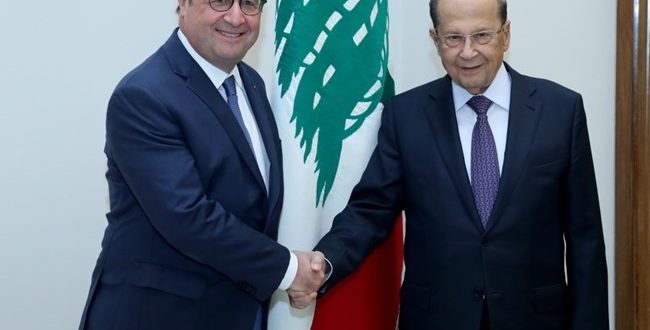BEIRUT: Former French President Francois Hollande Thursday wrapped up a two-day visit to Lebanon after meeting with top Lebanese officials to discuss matters relating to Lebanese sovereignty, the Syrian war and CEDRE reforms. Thursday morning, Hollande met President Michel Aoun at Baabda Palace to discuss Lebanon’s domestic situation and the pledged grants and soft loans made by the international community at the CEDRE conference, held in Paris last April to boost Lebanon’s infrastructure and economy.
The pair discussed Lebanon’s preparations to implement the conference’s recommendations that include reforms necessary to strengthen the Lebanese economy, according to a statement from Aoun’s office.
“Europe and France, in particular, are aware that Lebanon is a fragile country, and political support must be provided for it to avoid the negative impacts of the region,” Hollande told An-Nahar newspaper in an interview published Thursday.
Later in the day, Progressive Socialist Party leader Walid Joumblatt held a ceremony in honor of Hollande at his Mukhtara residence.
Hollande gave a speech, stating that Lebanon “represents a model to the world in a region plagued by wars. You have successfully established peace, security and unity.”
Joumblatt said Lebanon would not forget France’s support of its sovereignty. “The Syrian government refused to listen to the demands of its people, but President Hollande was the only one who took the initiative to support these demands,” he said.
Joumblatt also thanked the former French president for being “the only president on the side of the Syrian people after Barack Obama’s red line [was crossed].”
Hollande was one of the most outspoken critics of the former U.S. president’s inaction following the Syrian government’s use of chemical weapons in the early years of the country’s civil war.
Hollande’s stance on Syria was also a focal point during a talk he hosted Wednesday evening at the private francophone Saint Joseph University, titled: “24 Hours in the Life of a President.”
“It’s true, I could have taken a unilateral decision [to intervene in Syria] but it wouldn’t have been backed by an international mandate nor would it have been supported by the U.S., nor by most people in France,” he said at the event.
The decision had a grave consequence, Hollande admitted, because the Syrian regime then knew that it could cross so-called red lines.
“When a red line is crossed, there must be a reaction.”
He also spoke of difficult financial years in France during his presidency, when he faced the challenges of a huge fiscal deficit.
“This is something you’re familiar with here, of course,” he said.
One student used the opportunity to gauge Hollande’s opinion on U.S. President Donald Trump’s controversial decision to move the U.S. Embassy in Israel from Tel Aviv to occupied Jerusalem.
Hollande responded that he condemned Trump’s decision as it would make a two-state solution to the Israel-Palestine conflict more difficult. The answer was met with applause from the audience.
Speaking on the “European refugee crisis,” Hollande conceded that Europe should have better supported countries that neighbor Syria, such as Jordan, Turkey and Lebanon, and which continue to host vast numbers of refugees.
“If Lebanon hadn’t accepted so many refugees, they would’ve come to Europe,” he said, adding, “it is essential to find a political solution in Syria … and facilitate the transition to a democratic election.”
Hollande praised Lebanon for being his country’s partner in the region, saying, “when France looks towards the Middle East, where does it turn its eyes? Lebanon!”
Sitting in the front row were Kataeb party leader Nadim Gemayel and Walid Joumblatt, whom Hollande referred to as his “great friend.” The pair have met on multiple occasions in the past.
In February 2017, Joumblatt visited the Elysee Palace in Paris to discuss Franco-Lebanese relations.
Following the visit, the Druze leader shared a photo of him and Hollande accompanied by the caption, “a close friend forever.”
The Daily Star
 Lebanese Ministry of Information
Lebanese Ministry of Information



